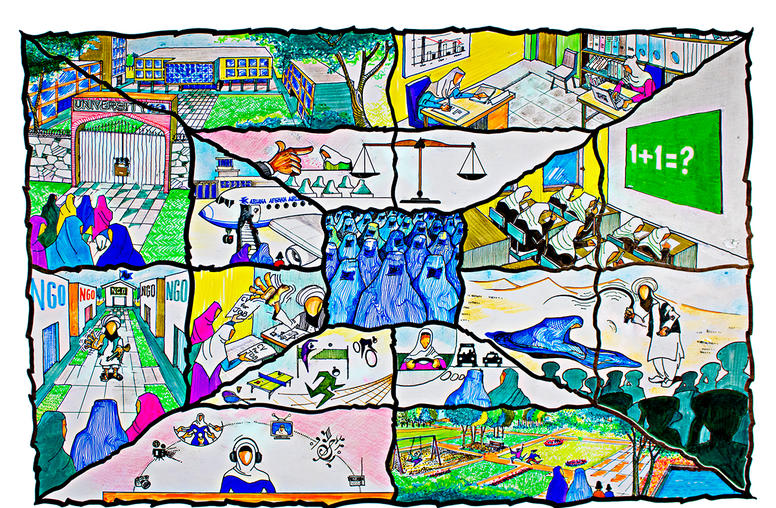Tuesday, April 23, 2024

The Latest @ USIP: The Future of U.S.-Philippines Relations
The U.S.-Philippines relationship runs deep, with the two countries working together on a host of issues ranging from security challenges in the South China Sea to economic growth and peacebuilding in the Mindanao region. However, climate change has emerged as one of the most pressing challenges facing the Philippines — and the risk for climate-related disasters is only going to intensify in the years ahead. USIP spoke with Philippines experts to discuss the U.S.-Philippines relationship and where it can go from here.

The Latest @ USIP: Climate Change is Driving Migration in the Horn of Africa
Climate change is already an acute issue in the East and Horn of Africa. Agricultural and pastoral communities are now facing their sixth straight season of drought, and without a way to shield themselves from the impact, they have very few options but to move. Amy Pope, the director general-elect of the International Organization for Migration, discusses how global aid agencies must continue providing life-saving assistance to those already displaced — but should also help vulnerable communities anticipate and mitigate the impacts of climate change to protect their livelihoods and avoid displacement altogether.

The Latest @ USIP: How to Reverse Latin America’s Governance Crisis
Despite massive democratic progress over the last 40 years, Latin America is currently experiencing a governance crisis, with extreme polarization and diminished public trust in institutions. Michelle Muschett, the regional director for Latin America and the Caribbean at the U.N. Development Programme, discusses how peacebuilding and development practices can help restructure governance institutions to meet people’s needs — with a special emphasis on increasing youth’s participation in political and civic life.

The Latest @ USIP: What China’s Nuclear Advances Mean for India
Despite ongoing confrontations along their shared Himalayan border, the India-China nuclear relationship remains fairly stable at this point in time. Both countries maintain a no-first-use policy and officials have not broached the possibility of nuclear escalation. However, China’s expanding nuclear arsenal poses questions for India’s own nuclear posture. The Observer Research Foundation’s Rajeshwari Rajagopalan explains that China’s recent nuclear advances alone haven’t raised alarm in New Delhi — but that Indian leaders should pay special attention to any shifts in Beijing’s no-first-use policy or developments in first-strike options.

The Latest @ USIP: For Myanmar’s Economy to Recover, Military Rule Must End
Myanmar’s February 2021 military coup wiped out almost all the economic progress that had been made under civilian rule. Today, the country’s economy remains completely devastated, with the national currency having lost 30 percent of its value amid widespread junta violence and instability. Macquarie University’s Sean Turnell — who served as an economic advisor to deposed leader Aung San Suu Kyi before being imprisoned by the junta for nearly two years — says there’s only one way to solve Myanmar’s economic crisis: military rule must end. And the international community should do all it can to ensure a return to democratic, civilian governance.

The Latest @ USIP: How a Colombian City Is Turning Vulnerable Youth into Peacebuilders
Palmira, Colombia, is often listed among the most violent cities in the world. After realizing that the violence couldn’t be addressed solely through policing, the local government developed PAZOS -- Peace and Opportunities -- a social program that provides alternative environments for young people, particularly young men, who might otherwise get swept up in cycles of violence. Palmira Mayor Óscar Escobar explains how PAZOS offers opportunities for vulnerable youth to build peace in their communities; why partnerships with the police, private sector, NGOs and community organizations have been crucial to its success; and why he believes the program can be replicated around the world.

The Latest @ USIP: China’s Approach to International Peacebuilding
While China has not sought to overturn traditional norms in international peacebuilding, Chinese peacebuilding practices do prioritize different issues — with very little emphasis given to human rights and more emphasis on basic human needs. Keith Krause, director of the Geneva Graduate Institute’s Centre on Conflict, Development and Peacebuilding, discusses China’s growing footprint in post-conflict settings around the world, why China chooses to pursue peace through economic development rather than democracy promotion, and what the rise of actors such as China means for international peacebuilding more broadly.

The Latest @ USIP: How to Break Cycles of Violence Against Women
When it comes to the Women, Peace and Security agenda, men’s participation might seem like an afterthought. But men’s actions during conflict and throughout peace processes directly affect women — and actively engaging men on this issue can open benefits for men, women and their communities. Gary Barker, CEO and co-founder of Equimundo: Center for Masculinities and Social Justice, discusses his work trying to break cycles of men’s use of violence against women.

The Latest @ USIP: What Would Effective U.S.-China Crisis Communication Look Like?
There are a number of avenues for communication between China and the United States, but few are formal, established connections between the two governments. This leaves policymakers dependent on less direct mechanisms that make it difficult for each side to get a clear sense of what the other is looking to achieve — a predicament that is especially dangerous for crisis communications. Chad Sbragia, a research staff member at Institute for Defense Analyses, discusses how U.S.-China crisis communications can be improved and why effective diplomacy with China may resemble bargaining more than cooperation.

Tracking the Taliban's (Mis)Treatment of Women
When Afghan women step out of their homes, everywhere they look they see a range of Taliban restrictions affecting all aspects of society and their lives — from education and employment to public services and access to justice. This interactive graphic depicts what they see through their burqas — the breadth of the Taliban’s gender apartheid — and serves as a portal to learning more about Taliban restrictions on women’s social and political life. Along with a description of the types of restrictions the Taliban have imposed, clicking on an “X” links to USIP’s documentation of the relevant decrees, orders and edicts issued by the Taliban since they took power in August 2021.
